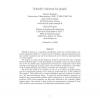Free Online Productivity Tools
i2Speak
i2Symbol
i2OCR
iTex2Img
iWeb2Print
iWeb2Shot
i2Type
iPdf2Split
iPdf2Merge
i2Bopomofo
i2Arabic
i2Style
i2Image
i2PDF
iLatex2Rtf
Sci2ools
CORR
2010
Springer
2010
Springer
Schaefer's theorem for graphs
Schaefer's theorem is a complexity classification result for so-called Boolean constraint satisfaction problems: it states that every Boolean constraint satisfaction problem is either contained in one out of six classes and can be solved in polynomial time, or is NP-complete. We present an analog of this dichotomy result for the first-order logic of graphs instead of Boolean logic. In this generalization of Schaefer's result, the input consists of a set W of variables and a conjunction of statements ("constraints") about these variables in the language of graphs, where each statement is taken from a fixed finite set of allowed formulas; the question is whether is satisfiable in a graph. We prove that either is contained in one out of 17 classes of graph formulas and the corresponding problem can be solved in polynomial time, or the problem is NP-complete. This is achieved by a universal-algebraic approach, which in turn allows us to use structural Ramsey theory...
Constraint Satisfaction Problems | CORR 2010 | Education | Polynomial Time | Satisfaction Problems |
Related Content
| Added | 01 Mar 2011 |
| Updated | 01 Mar 2011 |
| Type | Journal |
| Year | 2010 |
| Where | CORR |
| Authors | Manuel Bodirsky, Michael Pinsker |
Comments (0)

